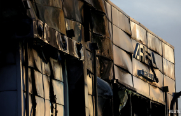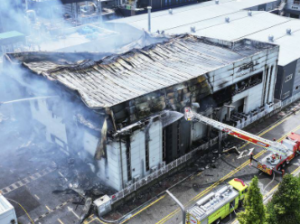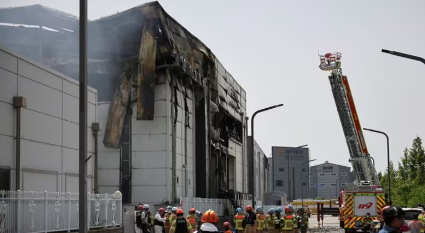Keywords: Aricell CEO arrested, South Korea factory fire, lithium battery safety, Park Soon-kwan arrest, workplace safety violations, South Korea industrial disaster, lithium battery industry, foreign workers safety, corporate accountability South Korea.
SEOUL, South Korea, August 29, 2024 — The chief executive of Aricell, a prominent South Korean lithium battery manufacturer, has been arrested in connection with a devastating factory fire in June that claimed the lives of 23 people and left nine others injured. The fire, which has been deemed one of the worst industrial disasters in South Korea in recent years, has raised serious concerns about workplace safety and corporate responsibility.
CEO Park Soon-kwan Arrested
Park Soon-kwan, the CEO of Aricell, was arrested following a court-approved warrant on Wednesday. The arrest comes after an extensive police investigation that uncovered multiple safety violations at the factory. Authorities have pointed to these violations as contributing factors to the deadly fire.
The investigation revealed that Aricell’s management had been pushing to meet production deadlines, leading to compromised safety standards. Among the issues cited were the failure to address quality defects in the batteries, the employment of unskilled workers to handle hazardous materials, and allegations that the company had falsified quality inspections for military contracts.
The June 24th Blaze
The tragic incident occurred on June 24th when several battery cells exploded, igniting a massive fire at the Aricell plant. At the time of the fire, the factory’s second floor housed approximately 35,000 battery cells, which were in the process of being inspected and packaged.
The nature of the fire presented significant challenges to firefighters, as lithium fires can react violently with water. Firefighters were forced to use dry sand to extinguish the blaze, which took several hours to bring under control. The fire claimed the lives of 23 workers, many of whom were foreign nationals from countries including China and Laos.
Corporate Response and Safety Failings
In the aftermath of the fire, CEO Park issued a public apology, expressing deep regret over the loss of life and offering condolences to the families of the victims. “We are deeply saddened by the loss of life and would like to express our deepest condolences and apologies to the bereaved families. We take great responsibility and will sincerely provide support to the deceased and their families in every way possible,” Park stated.

Despite these assurances, the arrest of Park highlights the serious safety lapses at the factory. Investigators noted that the company’s management had ignored critical safety measures in their rush to meet production targets. The alleged cheating in quality inspections, particularly in relation to military contracts, has further tarnished the company’s reputation.
Impact on the Industry
South Korea is a global leader in the production of lithium batteries, which are essential components in a wide range of products, from electric vehicles to consumer electronics. The Aricell fire has prompted increased scrutiny of safety practices across the industry, with calls for stricter regulations and oversight to prevent similar tragedies in the future.
The incident has also sparked discussions about the working conditions of foreign laborers in South Korea, who often take on dangerous jobs with inadequate safety protections. The deaths of foreign workers in the Aricell fire have drawn attention to the vulnerabilities faced by this workforce.
Future Implications
The arrest of Aricell’s CEO marks a significant development in the ongoing investigation into the factory fire. It underscores the importance of corporate accountability and the need for stringent enforcement of workplace safety regulations. As the legal process unfolds, it remains to be seen what further actions will be taken against those responsible for this tragic event.
Aricell’s parent company, S-Connect, has yet to comment on the arrest and the ongoing investigation. The outcome of this case could have far-reaching implications for the company and the broader lithium battery industry in South Korea.
Background on Aricell and the Lithium Battery Industry
- Aricell’s Role in the Industry: Aricell is a significant player in South Korea’s burgeoning lithium battery industry, which is crucial to the global supply chain for electric vehicles (EVs), consumer electronics, and energy storage systems. The company specializes in the production of high-capacity lithium-ion batteries, which are essential for the growing demand for sustainable energy solutions.
- Lithium Battery Market Overview: The global lithium battery market is rapidly expanding, with an estimated value of over $60 billion in 2024. South Korea is one of the top producers, alongside China and Japan, with companies like Samsung SDI, LG Energy Solution, and SK Innovation leading the market. The intense competition in the industry has driven companies to maximize production efficiency, sometimes at the expense of safety.
- Previous Incidents in the Industry: The lithium battery industry has a history of safety incidents due to the volatile nature of the materials involved. Lithium-ion batteries are prone to overheating and can cause fires or explosions if not handled properly. Similar incidents have occurred globally, raising concerns about the need for stringent safety protocols in production facilities.
- Details of the Aricell Factory Fire
- Cause of the Fire: The June 24th fire at the Aricell plant was triggered by the explosion of several battery cells. Investigators found that the factory was housing around 35,000 battery cells on its second floor, where they were being inspected and packaged. The presence of such a large quantity of volatile material in one location significantly increased the risk of a catastrophic event.
- Firefighting Challenges: Lithium fires are notoriously difficult to extinguish because they can react violently with water, leading to further explosions. Firefighters responding to the Aricell blaze had to use specialized techniques, including dry sand, to bring the fire under control. The blaze took several hours to be fully extinguished, and by then, it had caused extensive damage and loss of life.
- Casualties and Victims: Among the 23 people who lost their lives in the fire, many were foreign workers from countries such as China and Laos. The incident has drawn attention to the working conditions of foreign laborers in South Korea, who often work in hazardous environments with inadequate safety measures. The injured included both local and foreign workers, highlighting the diverse workforce at the plant.
- Legal and Regulatory Implications
- Corporate Accountability: The arrest of CEO Park Soon-kwan has sparked a broader discussion on corporate responsibility and accountability in South Korea. Legal experts have pointed out that this case could set a precedent for how senior executives are held accountable for safety violations and workplace accidents. The South Korean government has been under pressure to enforce stricter regulations and ensure compliance in high-risk industries.
- Workplace Safety Regulations: South Korea’s industrial sector has faced criticism for inadequate enforcement of workplace safety regulations. The Ministry of Employment and Labor has announced plans to review and possibly tighten safety standards in response to the Aricell incident. This includes more frequent inspections and harsher penalties for companies that fail to adhere to safety protocols.
- Impact on Aricell’s Business: The fire and subsequent legal action against Aricell’s CEO could have severe repercussions for the company. Potential outcomes include financial penalties, a loss of business contracts, and reputational damage. Investors and partners may also reassess their involvement with the company, especially in light of the allegations of falsified quality inspections related to military contracts.
- Industry and Economic Impact
- Impact on the Lithium Battery Supply Chain: The incident at Aricell could lead to disruptions in the supply chain for lithium batteries, particularly if the company is forced to halt production during the investigation. This could affect not only the South Korean market but also global supply chains, given the reliance on lithium batteries in various industries.
- Investor Sentiment: The arrest of a high-profile CEO like Park Soon-kwan could negatively impact investor confidence in South Korea’s industrial sector. The incident may lead to increased scrutiny of other companies in the sector, with investors demanding better transparency and adherence to safety standards.
- Response from Competitors: Competitors in the lithium battery industry may take advantage of Aricell’s current difficulties to strengthen their market position. Companies like Samsung SDI and LG Energy Solution, which have more established safety protocols, may attract new contracts and partnerships as customers seek more reliable suppliers.
- Future Outlook
- Potential Legal Outcomes: The legal proceedings against Park Soon-kwan will be closely watched, as they may influence future corporate governance practices in South Korea. If found guilty, Park could face significant jail time, and Aricell could be subject to substantial fines and compensation claims from the victims’ families.
- Reforms and Industry Changes: The South Korean government may introduce new regulations or reform existing ones to prevent similar incidents in the future. This could include mandatory safety audits, stricter controls on the storage and handling of hazardous materials, and better protections for foreign workers.
- Long-term Industry Implications: The incident could lead to a broader reevaluation of safety practices across the lithium battery industry. Companies may need to invest more in safety technologies and training to avoid the risks associated with high-speed production environments. This could lead to increased costs, but also to a more sustainable and safe industry in the long run.






